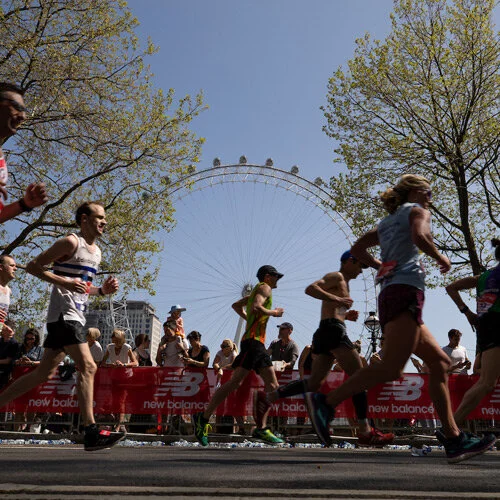Tips for easing post-race soreness and supporting your recovery
Completing a road marathon like the London Marathon is an incredible achievement – but the recovery that follows is just as important as your training. Whether you’re an experienced marathon runner or a first-timer, it’s completely normal to feel sore, stiff, and fatigued in the hours and days after your race.
Read on for our top marathon recovery tips and to take advantage of our post-marathon massage offer.
Post-marathon recovery tips
“The moment you cross the finish line, resist the urge to sit – keep moving to avoid your legs seizing up. If you’re going to the pub, perch on a high stool, if you’re by the sea, walk into the cool water up to your waist. Lie down when you get home”
Here are some other practical ways to speed up your recovery and take care of your body after crossing the finish line:
1. Rehydrate
After a long race, rehydration is key. Your body has lost a significant amount of fluid and electrolytes. Drink regularly – not just water, but also electrolyte-rich drinks – to support your body's recovery and avoid fatigue or cramps.
2. Eat well
Focus on protein-rich foods in the days following your marathon. Protein helps repair and rebuild muscle tissue, while carbohydrates help replenish your glycogen stores. Try to eat a balanced meal within two hours of finishing the race.
3. Hot/cold therapy
Many runners find that contrast baths or showers (alternating hot and cold water) can help reduce swelling and boost circulation. Alternatively, elevate your legs when resting to help reduce muscle soreness and promote lymphatic drainage. *Emily’s top tip* – “Using magnesium flakes in a hot bath is great for sore muscles.”
4. Book a massage
A gentle sports massage a few days post-race (not immediately after) can help ease muscle tension and improve recovery. It’s also a great opportunity to check in with a physiotherapist if you’re carrying any niggles or pain.
5. Keep moving (gently!)
Although rest is important, it’s just as crucial to keep moving. Gentle exercise like walking, swimming, Pilates or yoga helps keep your blood flowing and your muscles mobile. Avoid strenuous exercise for at least a week, and don’t jump straight into another high-impact workout.
6. Listen to your body
Recovery isn’t a one-size-fits-all process. Take note of how your body feels, and don’t rush back into running. If anything feels unusual – especially joint pain, limping, or swelling – get assessed by a physiotherapist.
Want help with your recovery?
Our team of expert physiotherapists are here to support you with post-race recovery, sports massage, or preparing for your next event with running assessments and injury prevention strategies.
When you book a sports massage with Emily, use the special code *MARATHON10* to get a special 10% discount.
To book an appointment or get tailored recovery advice, contact us at
📞 02030 12 12 22
Or use our contact form on our booking page here - https://physioremedies.com/contact-booking
Your next PB starts with proper recovery!



